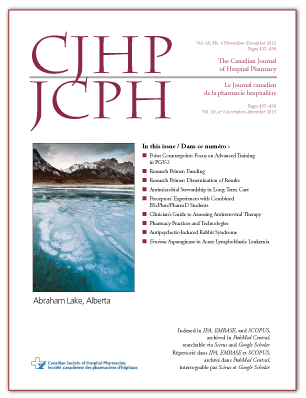Antibiotic Use and Need for Antimicrobial Stewardship in Long-Term Care
DOI:
https://doi.org/10.4212/cjhp.v68i6.1500Keywords:
antimicrobial stewardship, long-term care, antibiotic use, gérance des antimicrobiens, soins de longue durée, antibiothérapieAbstract
ABSTRACT
Background: Antimicrobial stewardship may be important in long-term care facilities because of unnecessary or inappropriate antibiotic use observed in these residents, coupled with their increased vulnerability to health care–associated infections.
Objectives: To assess antibiotic use in a long-term care facility in order to identify potential antimicrobial stewardship needs.
Methods: A retrospective descriptive study was conducted at the Veterans Centre, a long-term care facility at Sunnybrook Health Sciences Centre, Toronto, Ontario. All residents taking one or more antibiotics (n = 326) were included as participants. Antibiotic-use data for patients residing in the facility between April 1, 2011, and March 31, 2012, were collected and analyzed.
Results: Totals of 358 patient encounters, 835 antibiotic prescriptions, and 193 positive culture results were documented during the study period. For 36% (302/835) of antibiotic prescriptions, the duration was more than 7 days. Cephalosporins (30%; 251/835) and fluoroquinolones (28%; 235/835) were the most frequently prescribed antibiotic classes. Urine was the most common source of samples for culture (60%; 116/193).
Conclusions: Characteristics of antimicrobial use at this long-term care facility that might benefit from further evaluation included potentially excessive use of fluoroquinolones and cephalosporins and potentially excessive duration of antibiotic use for individual patients.
RÉSUMÉ
Contexte : La gérance des antibiotiques peut s’avérer importante au sein des établissements de soins de longue durée à cause d’une utilisation inutile ou inappropriée des antibiotiques chez les résidents de ces établissements et de leur vulnérabilité aux infections nosocomiales.
Objectifs : Évaluer l’utilisation des antibiotiques dans un établissement de soins de longue durée afin de déterminer si une gérance des antimicrobiens peut être nécessaire.
Méthodes : Une étude descriptive rétrospective a été réalisée au Veterans Centre, un établissement de soins de longue durée au sein du Sunnybrook Health Sciences Centre, à Toronto en Ontario. Tous les résidents prenant au moins un antibiotique (n = 326) ont été admis à l’étude. Des données sur les antibiothérapies pour des patients résidant dans l’établissement entre le 1er avril 2011 et le 31 mars 2012 ont été recueillies et analysées.
Résultats : Pendant l’étude, on a consigné en tout 358 séjours de patients, 835 prescriptions d’antibiotiques et 193 résultats positifs de culture. Pour 36 % (302/835) des prescriptions d’antibiotiques, le traitement était de plus de 7 jours. Les céphalosporines (30 % [251/835]) et les fluoroquinolones (28 % [235/835]) étaient les antibiotiques les plus souvent prescrits. Les cultures étaient le plus souvent obtenues à partir d’urines (60 % [116/193]).
Conclusions : L’utilisation possiblement excessive de fluoroquinolones et de céphalosporines ainsi que la durée potentiellement exagérée des antibiothérapies font partie des caractéristiques de l’emploi des antimicrobiens dans cet établissement de soins de longue durée qui pourraient mériter de plus amples évaluations.
Downloads
Downloads
Published
Issue
Section
License
Copyright © Canadian Society of Healthcare-Systems Pharmacy.
After publication of a manuscript in the CJHP, the authors of the manuscript must obtain written permission from the CSHP (publications@cshp.ca) before reproducing any text, figures, tables, or illustrations from the work in future works of their own. If a submitted manuscript is declined for publication in the CJHP, all said rights shall revert to the authors. Please note that any forms (e.g., preprinted orders and patient intake forms) used by a specific hospital or other health care facility and included as illustrative material with a manuscript are exempt from this copyright transfer. The CJHP will require a letter from the hospital or health care facility granting permission to publish the document(s).










